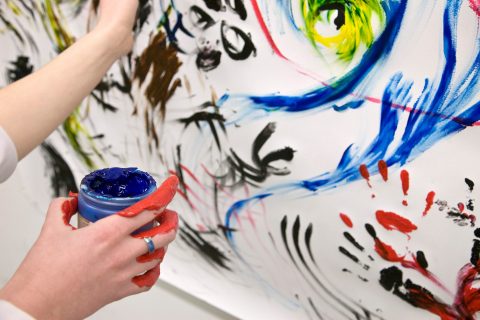Art Therapy, Creative Arts Therapies (MA)
Program overview
The MA in Creative Arts Therapies, Art Therapy option, allows you to combine your passion for art with therapeutic work. Art therapists look at how visual imagery can help people overcome psychological issues and address emotional difficulties in ways that spoken language cannot. You will develop wide-reaching applications for art therapy, working directly with clients alongside departmental supervisors. Placement opportunities include hospitals and health care institutions, community centres, geriatric facilities, and schools. The Art Therapy option is a professional program that meets the education standards set by the Canadian Art Therapy Association.
Program structure
Degree Requirements
Fully-qualified candidates are required to complete 60 credits.
Please see the Creative Arts Therapies Courses page for course descriptions.
Creative Arts Therapies (Art Therapy Option) MA (60 credits)
| 45 | credits of Core Courses: • CATS 639 Interdisciplinary Topics: Cross-cultural Competence in the Creative Arts Therapies (1.00) • CATS 641 Interdisciplinary Topics: Ethics in Clinical Practice in the Creative Arts Therapies (1.00) |
| 6 | credits of Elective Courses chosen in consultation with an academic faculty advisor, are required of all candidates. With the approval of the Chair of Creative Arts Therapies and that of the cooperating department, some or all of the elective credits may be chosen from other graduate programs in the Faculty of Fine Arts, in other faculties at Concordia, or other universities. |
| 9 | credits chosen from one of the following: Research Paper Stream: Creative Arts Therapies (Art Therapy Option) Applied Research Project Stream: Creative Arts Therapies (Art Therapy Option) |
Admission requirements
Admission Requirements
- Bachelor’s degree with 24 credits in visual arts (18 credit in studio arts and 6 credits in art history, art theory, art education or approved equivalents); 24 credits in psychology (must include courses in Introductory, Developmental and Abnormal Psychology, Theories of Personality, and Research Methodology, or approved equivalents); and An Introduction to Art Therapy (3 credits).
- Overall grade average of B or better is expected.
- Previous work experience in a clinical, rehabilitative or educational setting is expected.
- Direct experience with the therapeutic process is highly desirable.
- Proficiency in English. Applicants whose primary language is not English must demonstrate that their knowledge of English is sufficient to pursue graduate studies in their chosen field. Please refer to the English language proficiency page for further information on requirements and exemptions.
Application process
Application deadlines

FALL
January 15

WINTER
n/a

SUMMER
n/a
Priority will be given to complete applications submitted by the deadline. In some cases, programs may continue to accept applications as long as there is space available.
International students: Considering the waiting period involved in meeting the entry requirements to Canada and Quebec, we strongly encourage international applicants to apply early and submit supporting documents prior to the deadline.
Tuition & funding
Tuition and fees
Tuition and fees of the program may depend on your student status, among other key factors. Estimate these costs based on the most common situations.
Awards and funding
Funding packages are generally available for students in thesis-based programs. Course-based students may be eligible for a number of donor awards, and may consult with their department for program-specific opportunities.
Out-of-province students
Get $15,000 in special funding for 60-credit master's programs. Learn more
Other programs of interest

Draw on personal experience to develop your own philosophy of art education by connecting your studio practice with pedagogical theory in a program best suited to your individual academic and professional goals.
Department
Faculty


